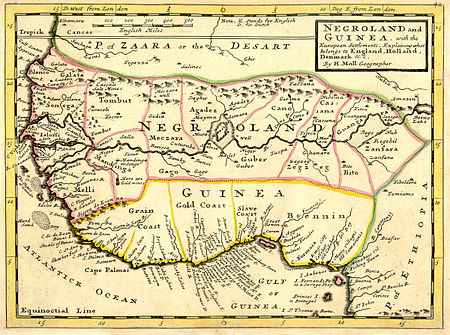In English

A European map of
West Africa, 1736. Included is the archaic mapping designation of
Negroland.

"Negro" was once an acceptable term.
All-Negro Comics was a 1947 comic anthology written by African-American writers and featuring black characters.
Around 1442, the Portuguese first arrived in
Southern Africa while trying to find a sea route to
India. The term
negro, literally meaning 'black', was used by the Spanish and Portuguese as a simple description to refer to the
Bantu peoples that they encountered. From the 18th century to the late 1960s,
negro (later capitalized) was considered to be the proper
English-language term for people of black African origin.
United States
Negro superseded colored as the most polite word for African Americans at a time when black was considered more offensive.[3] This word was accepted as normal, including by people classified as Negroes, until the late 1960s, after the later African-American Civil Rights Movement. One well-known example is the identification by
Martin Luther King, Jr. of his own race as "Negro" in his famous speech of 1963, "
I Have a Dream".
During the civil rights movements era of the 1950s and 1960s, some black American leaders in the United States, notably Malcolm X, objected to the word Negro because they associated it with the long history of slavery, segregation, and discrimination that treated African Americans as second class citizens, or worse.[4] Malcolm X preferred Black to Negro, but also started using the term
Afro-American after leaving the
Nation of Islam.
[5]
Since the late 1960s, various other terms have been more widespread in popular usage. These include
black,
Black African,
Afro-American (in use from the late 1960s to 1990) and
African American (used in the United States to refer to black Americans, people often referred to in the past as American Negroes).
[6]
The term
Negro is still used in some historical contexts, such as in the name of the
United Negro College Fund[7][8] and the
Negro league in sports.
The
United States Census Bureau announced that
Negro would be included on the
2010 United States Census, alongside
Black and
African-American, because some older black Americans still self-identify with the term.
[9][10][11]
The word Negro fell out of favor by the early 1970s in the United States after the African-American Civil Rights Movement. However, many older African Americans initially found the term black more offensive than Negro. In current English language usage, Negro is generally considered to be acceptable in a historical context, such as Negro spirituals or baseball's Negro Leagues of the early and mid-20th century, or in the name of older organizations, as in the United Negro College Fund or the Journal of Negro Education. The U.S. Census now uses the grouping "Black, African-American, or Negro." Negro is used in efforts to include older African Americans who more closely associate with the term.[12] According to Oxford Dictionaries, use of the word "now seems out of date or even offensive in both British and US English".
[13]
A specifically female form of the word,
negress (sometimes capitalized), was occasionally used. However, like
Jewess, it has all but completely fallen from use. The related word
Negroid was used by 19th- and 20th-century racial
anthropologists. The suffix
-oid means "similar to". "Negroid" as a noun was used to designate a wider or more generalized category than
Negro; as an adjective it qualified a noun as in, for example, "negroid features".
[14]
 Negro is the earliest word given to african/african slaves who faced this degradation. Getting away from the word "negro" was the impetus for Aframs creating the modern concept of "black" identity
Negro is the earliest word given to african/african slaves who faced this degradation. Getting away from the word "negro" was the impetus for Aframs creating the modern concept of "black" identity





 Its almost like the ultimate "win" for the white man. Its almost like a beaten and battered woman calling HERSELF a "b1tch" or a "slut" because its been ingrained into her psyche. Or a child calling him or herself "stupid" because thats all he/she hears from the parents and teachers.
Its almost like the ultimate "win" for the white man. Its almost like a beaten and battered woman calling HERSELF a "b1tch" or a "slut" because its been ingrained into her psyche. Or a child calling him or herself "stupid" because thats all he/she hears from the parents and teachers.


